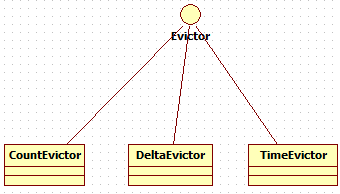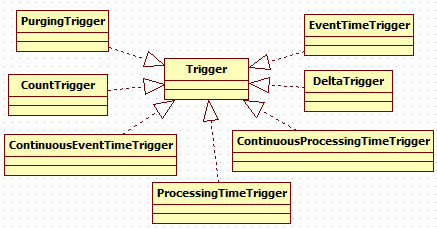window是处理数据的核心。按需选择你需要的窗口类型后,它会将传入的原始数据流切分成多个buckets,所有计算都在window中进行。
flink本身提供的实例程序TopSpeedWindowing.java
import org.apache.flink.api.common.functions.RichMapFunction; import org.apache.flink.api.java.tuple.Tuple4; import org.apache.flink.api.java.utils.ParameterTool; import org.apache.flink.streaming.api.TimeCharacteristic; import org.apache.flink.streaming.api.datastream.DataStream; import org.apache.flink.streaming.api.environment.StreamExecutionEnvironment; import org.apache.flink.streaming.api.functions.source.SourceFunction; import org.apache.flink.streaming.api.functions.timestamps.AscendingTimestampExtractor; import org.apache.flink.streaming.api.functions.windowing.delta.DeltaFunction; import org.apache.flink.streaming.api.windowing.assigners.GlobalWindows; import org.apache.flink.streaming.api.windowing.evictors.TimeEvictor; import org.apache.flink.streaming.api.windowing.time.Time; import org.apache.flink.streaming.api.windowing.triggers.DeltaTrigger; import java.util.Arrays; import java.util.Random; import java.util.concurrent.TimeUnit; /** * An example of grouped stream windowing where different eviction and trigger * policies can be used. A source fetches events from cars every 100 msec * containing their id, their current speed (kmh), overall elapsed distance (m) * and a timestamp. The streaming example triggers the top speed of each car * every x meters elapsed for the last y seconds. */ public class TopSpeedWindowing { // ************************************************************************* // PROGRAM // ************************************************************************* public static void main(String[] args) throws Exception { final ParameterTool params = ParameterTool.fromArgs(args); final StreamExecutionEnvironment env = StreamExecutionEnvironment.getExecutionEnvironment(); env.setStreamTimeCharacteristic(TimeCharacteristic.EventTime); env.getConfig().setGlobalJobParameters(params); @SuppressWarnings({"rawtypes", "serial"}) DataStream<Tuple4<Integer, Integer, Double, Long>> carData; if (params.has("input")) { carData = env.readTextFile(params.get("input")).map(new ParseCarData()); } else { System.out.println("Executing TopSpeedWindowing example with default input data set."); System.out.println("Use --input to specify file input."); carData = env.addSource(CarSource.create(2)); } int evictionSec = 10; double triggerMeters = 50; DataStream<Tuple4<Integer, Integer, Double, Long>> topSpeeds = carData .assignTimestampsAndWatermarks(new CarTimestamp()) //1 .keyBy(0) .window(GlobalWindows.create()) //2 .evictor(TimeEvictor.of(Time.of(evictionSec, TimeUnit.SECONDS))) //3 .trigger(DeltaTrigger.of(triggerMeters, new DeltaFunction<Tuple4<Integer, Integer, Double, Long>>() {//4 private static final long serialVersionUID = 1L; @Override public double getDelta( Tuple4<Integer, Integer, Double, Long> oldDataPoint, Tuple4<Integer, Integer, Double, Long> newDataPoint) { return newDataPoint.f2 - oldDataPoint.f2; } }, carData.getType().createSerializer(env.getConfig())))//4 .maxBy(1); if (params.has("output")) { topSpeeds.writeAsText(params.get("output")); } else { System.out.println("Printing result to stdout. Use --output to specify output path."); topSpeeds.print(); } env.execute("CarTopSpeedWindowingExample"); } // ************************************************************************* // USER FUNCTIONS // ************************************************************************* private static class CarSource implements SourceFunction<Tuple4<Integer, Integer, Double, Long>> { private static final long serialVersionUID = 1L; private Integer[] speeds; private Double[] distances; private Random rand = new Random(); private volatile boolean isRunning = true; private CarSource(int numOfCars) { speeds = new Integer[numOfCars]; distances = new Double[numOfCars]; Arrays.fill(speeds, 50); Arrays.fill(distances, 0d); } public static CarSource create(int cars) { return new CarSource(cars); } @Override public void run(SourceContext<Tuple4<Integer, Integer, Double, Long>> ctx) throws Exception { while (isRunning) { Thread.sleep(100); for (int carId = 0; carId < speeds.length; carId++) { if (rand.nextBoolean()) { speeds[carId] = Math.min(100, speeds[carId] + 5); } else { speeds[carId] = Math.max(0, speeds[carId] - 5); } distances[carId] += speeds[carId] / 3.6d; Tuple4<Integer, Integer, Double, Long> record = new Tuple4<>(carId, speeds[carId], distances[carId], System.currentTimeMillis()); ctx.collect(record); } } } @Override public void cancel() { isRunning = false; } } private static class ParseCarData extends RichMapFunction<String, Tuple4<Integer, Integer, Double, Long>> { private static final long serialVersionUID = 1L; @Override public Tuple4<Integer, Integer, Double, Long> map(String record) { String rawData = record.substring(1, record.length() - 1); String[] data = rawData.split(","); return new Tuple4<>(Integer.valueOf(data[0]), Integer.valueOf(data[1]), Double.valueOf(data[2]), Long.valueOf(data[3])); } } private static class CarTimestamp extends AscendingTimestampExtractor<Tuple4<Integer, Integer, Double, Long>> { private static final long serialVersionUID = 1L; @Override public long extractAscendingTimestamp(Tuple4<Integer, Integer, Double, Long> element) { return element.f3; } } }
其中,
1. 定义时间戳,上篇文章<flink中的时间戳如何使用?---Watermark使用及原理>上进行了介绍,本篇不做赘述。
2.窗口类型,Windows Assigner定义如何将数据流分配到一个或者多个窗口;其层次结构如下:

evictor:用于数据剔除,其层次结构如下:

3. trigger:窗口触发器,其层次结构如下:

4. Window function定义窗口内数据的计算逻辑,其层次结构如下:

参考资料

微信公众号: 架构师日常笔记 欢迎关注!




